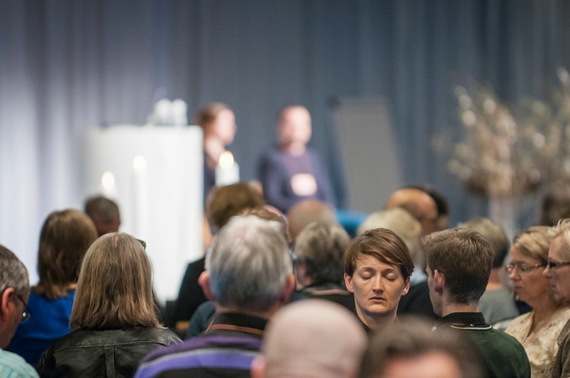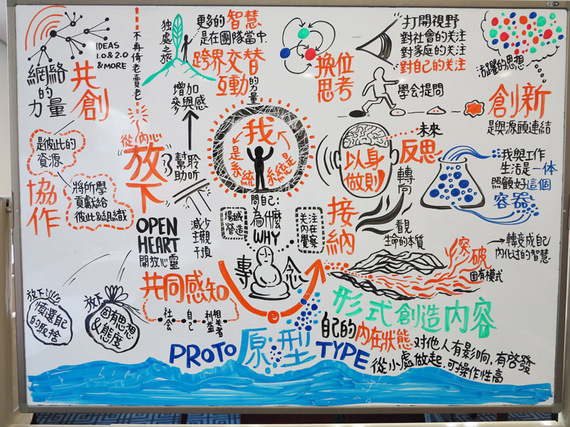I had an interesting week. On Monday I attended a book launch event in Denmark. The idea of the organizers was to create a "Nordic Forum" to bring together leaders and change-makers from many systems and sectors who are using awareness-based technologies of change (such as the one described in the Leading from the Emerging Future book that was introduced that day). Six hundred people from all walks of life showed up for this one-day gathering.
Entering the meeting space, I felt a wonderful energy of anticipation, an eagerness to learn about each other and about the connections between personal and societal change. We had set up the room in "neighborhoods" corresponding to the various hotspots ("acupuncture points") of societal change: reinventing finance, energy, health, education, compassionate business, and politics. The politics group, for example, talked about an initiative to reshape the political field by co-creating a new party that would not position itself as either left or right; instead it would focus on unleashing the power of massive direct participation and compassionate entrepreneurship. I think this more direct democratic initiative is a really interesting example that soon we may also see in other places... Just ask yourself: who is not fed up with the traditional (20th century) political and economic debate between left and right?
After the breakout sessions we reconvened in a plenary session, where participants shared some of their emerging insights. Here are the ideas and topics that attracted most of them: business with purpose and compassion; education; nature; 4. Sector, measuring what matters; strengthening our sources of health; mindfulness.
Then we went through a "presencing practice" (connecting to your deeper source of inspiration in order to sense and shape the future that wants to emerge) and formed coaching circles among change makers in order to help each other across organizations and systems. Over the next nine months, many of these groups will meet regularly and use case clinic tools to bring about profound renewal and change. Next December, at the second Nordic Forum, the participants will share what they were able to prototype, innovate, and learn.

(picture credits: 2014 M. Rangel Wulff)
When I left the meeting I was thinking: boy, this is really interesting, in only a single day you can activate such a powerful field of collective awareness, conversation, and connection; it's like switching on an already existing, but dormant social field. What if people could do that in regions and "hubs" around the world, and what if we could connect all these hubs in way that serves a deeper global intention for profound personal and societal renewal?
Next stop was China. A few observations. My first workshop was with leaders of a huge state-owned bank. It was the fourth of five workshops we've scheduled on a nine-month leadership journey toward profound innovation (formally part of the MIT IDEAS Program). We started with a "check-in circle" where each of the 25 participants shared some of what had happened for them personally over the previous three months. Almost everyone mentioned significant personal and relational changes. Most said that their thinking had changed. Instead of judging the world based on entrenched habits of thought, they were paying attention and listening. As one of them put it: "I try reduce the interference from myself." Many of them (though not all) also reported that they had changed how they work with their teams. One said: "I used to be the boss who talks, who tells them what is going on, and who tells them what to do. Now I ask them to share." Another put it: "I used to listen in order to correct them, now I ask questions in order to listen for solutions from them."
Throughout this check-in the participants also mentioned specific leadership practices that helped them to operate in different ways. Here are the seven practices that they mentioned repeatedly: (1) deep listening, (2) asking powerful questions, drawing people out, (3) letting go and letting come, (4) holding the space for their teams, (5) focusing on what you could change rather than complaining about what you can't, (6) connect to your heart, being empathic, and (7) using systems thinking--"thinking from source"--attending to the complex connections between the individual and the collective, between the inner and the outer. Looking at my notes, I realized that the group had just described the presencing practice model. (see also below the wonderful graphic recording by my colleague Jayce Lee).
Later in the week I also met with leaders of a fast-growing Chinese Internet tech company that is continuously reshaping its industry. What struck me is the amazing pace of change it had undergone since I last visited the company only 15 months earlier. What keeps such an enterprise together? What is the force at the eye of the hurricane? I saw a small core group of young entrepreneurial leaders who are linked by a shared sense of aspiration and commitment. Their aspiration is grounded in a deep-seated humanity (probably deeper than I have seen in most Western companies). As a senior government leader put it to me and my colleague Peter Senge a few days earlier: "We deeply appreciate the work you both are doing here with our leaders. It not only creates practical results and helps them to shift their mindset, it also connects them to the deeper levels of their will. It touches them in their soul."
As I boarded my return flight from Shanghai I felt physically tired but also energized and renewed. In these and several other inspiring encounters over the past few weeks, something has happened to me. I am changing. I feel a reordering from within. An idea that I have been holding in my mind for the past 20 years suddenly has become more deeply rooted in my will. It's the idea to create a global action leadership school for profound personal, and institutional renewal (what I have been calling a "u-school"). Through a web of interconnected hubs, this school would bring together leaders and change-makers from across sectors and cultures to prototype 4.0 platforms of societal innovation. Suddenly I see how this can work. Two catalysts are the potential partners I have been meeting with in China (and in other places, such as Brazil) and a new MOOC (Massive Open Online Course) I'll be creating at MIT.
This week I got the green light to offer my U-Lab class at MIT as a MOOC through MITx and its online platform edX. This is exciting news for me. For one, I am only the second faculty member at MIT Sloan to be given this opportunity. And two, the goal of this particular MOOC is to innovate and reinvent the existing model of online learning. Currently, many online courses attempt to teach technical knowledge. But the U-Lab MOOC project would try to do something different: make online learning work on a more profound level: to promote leadership, entrepreneurship and systemic changes; and to make the power of compassion-based entrepreneurship and systems change available for free and for everyone. The course, tentatively called U-LabX, will build on the existing model of online learning but then add the following dimensions:
•Live Global Forum events at the kick-off, mid-point, and conclusion of each five-week course (like the Nordic Forum described above).
•Structured Coaching Circles in which peer-coaching groups meet virtually between modules to engage in in-depth case clinic sessions.
•Practical tools that the participants use to engage differently with their social and institutional stakeholders each week.
•Virtual sensing journey tools, such as a video gallery of dialogue interviews with leading change-makers around the world.
•Personal awareness and mindfulness tools that allow the participants to engage differently with one another.
•Prototyping support for participants who, as individuals and groups, embark on real-world change initiatives during the course.
•An assessment tool that helps individuals and communities to evaluate the evolution of their deeper leadership capacities.
•An online community that helps participants find peers with whom they want to stay connected.
•A network of regional hubs that prototype the future of hybrid online/in-person learning that MIT--and other universities--are seeking to advance in the years ahead.
•Increasingly advanced U-Lab offerings over the coming years, with the first taking place in October 2014.
In other words, the U-Lab will be a launching pad for the u.school vision that I talked about earlier, a hybrid learning platform that links existing academic and non-academic institutions with inspired change-makers across sectors, cultures, and systems. This "reordering" of my thinking makes me feel, simultaneously, both younger and more serious--as if I am finally honing in on my real point of origin or intention. As if the real journey is only just now beginning...
Where have you seen and felt stuff like this? Such as gatherings that bring together a microcosm of society, thereby activating a social field (like the Nordic Forum)?
Have you seen MOOCs that move into the deeper territories of transformative change? What ideas do you have that could contribute?
Can you think of ways to radically democratize access to educational environments that blend the power of entrepreneurship with the power of the open heart?

